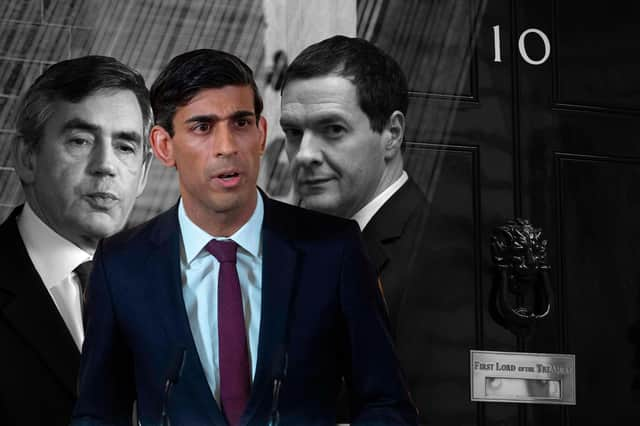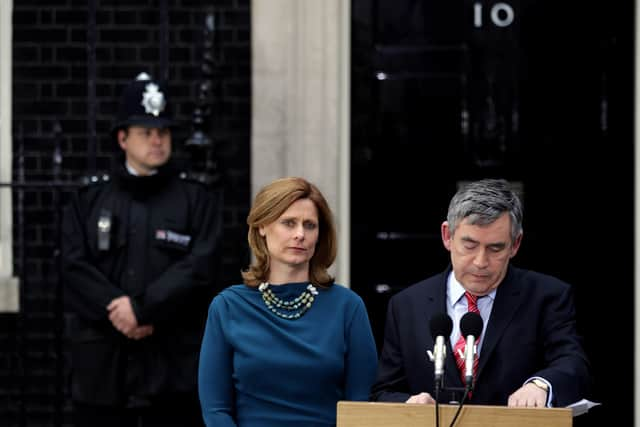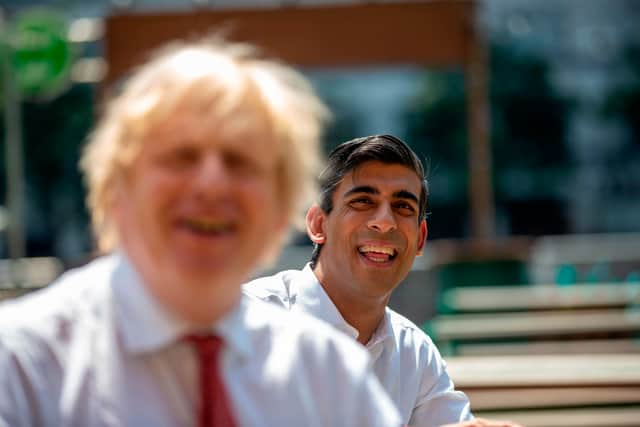Is Rishi Sunak the Prime Minister-in-waiting or a political Icarus?
This article contains affiliate links. We may earn a small commission on items purchased through this article, but that does not affect our editorial judgement.


Rishi Sunak is a busy man. From the letter which positioned him as the saviour of summer-holidays that somehow made its way into the pages of the Sunday Times, to a high-profile intervention encouraging people back into the office echoing recent calls from a certain Tory-backing paper which still, for now, favours its ex-star employee.
This burst of activity taken alongside polling of Conservative members which has Sunak as the cabinet member with the second highest net favourability (behind Liz Truss) and, more importantly, the favoured choice to replace Boris Johnson, has set tongues wagging in Westminster.
Advertisement
Hide AdAdvertisement
Hide AdSo, is Sunak going to be the next Prime Minister of the United Kingdom? If he manages it in the next two years, he’ll not only be the first ethnic minority PM but also the youngest since the early 19th century, narrowly taking that title from David Cameron. Having only become an MP in 2015, it would be a meteoric rise; but that seems like his current trajectory.
The move from 11 to 10 Downing Street
In 2020, Sunak became the 41st person to serve as Chancellor of the Exchequer since the turn of the 20th century. Around one in four of those went on to become Prime Minister, though the majority of these came during the pre and inter-war periods. H H Asquith, David Lloyd George, Stanley Baldwin, Neville Chamberlain and Winston Churchill all came to 10 Downing Street having already lived next door.
Since then a move from the second most important job in the country to the first has been a far less common career jump for Britain’s senior politicians. In the last 100 years, just four men have managed it, and none since Gordon Brown took over from Tony Blair in 2007.
There’s something deeply tragic about Brown’s tale. He had for over a decade been considered not just a, but the, man-in-waiting for the top job.


Advertisement
Hide AdAdvertisement
Hide AdHowever, upon entering office in 2007 he found himself at the head of a rapidly toxifying political project, with public opinion turning against the Iraq War and a world-altering financial crash on the horizon. These likely insurmountable factors, along with some character and strategic flaws, would see him unceremoniously dumped from office in an election not three years later.
Next came George Osborne, another anointed son who served as Chancellor under his Etonian schoolmate David Cameron and, like Brown before him, was long rumoured to harbour a desire for the top job. Many expected he would get it too, with Cameron and Osborne’s so-called compassionate conservatives the dominant faction in the party in the years after 2010.
That was until Brexit turned British politics not only upside down, but inside out and back to front. In an instant Cameron was gone, his credibility in tatters, along with that of his long-serving Chancellor.
Timing is everything
So what does all this say for Sunak’s chances? First, we have to assume he wants the top job in the first place; he has denied this, though a history of PMs who’ve formerly denied ambitions to become PM would be longer than that of former Chancellors by some way.
Advertisement
Hide AdAdvertisement
Hide AdLike Osborne and Brown, Sunak has been tipped by those within and without his party as the most likely candidate to replace his current boss.
Both men were, either having not long entered 10 Downing Street or not made it there at all, victims of seismic political shifts brought about through crises. Financial in Brown’s case and political in Osborne’s.
But, as in so many things, timing in politics is everything. The financial crisis which washed away Brown’s hopes occurred not long after he became PM, while the one which scuppered Osborne’s chances came when he was already a well-worn figure, carrying plenty of baggage.
Sunak has not only weathered what is almost certainly (hopefully) the biggest crisis of his political career, but his brand was forged in it. He was not disrupted by the pandemic; in political terms, he is a product of it.
Advertisement
Hide AdAdvertisement
Hide AdMore so than Osborne, it could be said that Brown suffered as a result of his predecessor outstaying his welcome. Once great friends and allies, Blair’s refusal to move aside in his second term prompted a bitter feud between the pair, and likely sealed Brown’s fate as one of the country’s shortest-serving PMs.


But on this score the odds, again, seem in Sunak’s favour. Not even a full term into his role, rumours have been ever-present that Johnson may have regrets about taking on the top job. The remuneration, it’s said, is not enough for him.
Should he get the job, this is unlikely to be an issue for Sunak, whose vast personal wealth is dwarfed only by someone like, say, IT billionaire and one of the richest men in India, N.R Narayana Murthy - his father-in-law.
The path to power looks a fairly straightforward one for Sunak. That the opposition leader’s name hasn’t appeared once in this discussion should signal how likely it is considered that he will be what stops Sunak becoming the next Prime Minister. Indeed, the only thing which suggests Sunak won’t do it is that, if anything, it all seems a bit too easy.
Advertisement
Hide AdAdvertisement
Hide AdWhile the story of Brown feels like a biblical fable about the consequences of coveting thy neighbour’s job, perhaps the danger for Sunak is in the ease of his ascent.
Rather than biblical, his story could be ancient Greek, with Sunak cast as Icarus. Young, bright and ambitious, it was only his own hubris which felled him, when it drove him too close to the sun.
Do you agree? Let us know what you think in the comments below
A message from the editor:
Thank you for reading. NationalWorld is a new national news brand, produced by a team of journalists, editors, video producers and designers who live and work across the UK. Find out more about who’s who in the team, and our editorial values. We want to start a community among our readers, so please follow us on Facebook, Twitter and Instagram, and keep the conversation going. You can also sign up to our newsletters and get a curated selection of our best reads to your inbox every day.
Comment Guidelines
National World encourages reader discussion on our stories. User feedback, insights and back-and-forth exchanges add a rich layer of context to reporting. Please review our Community Guidelines before commenting.